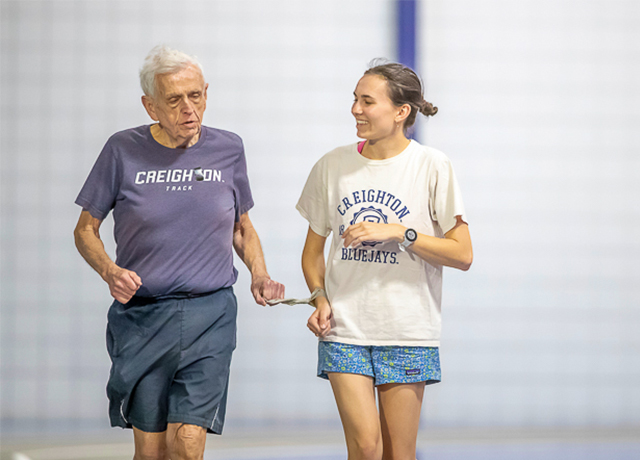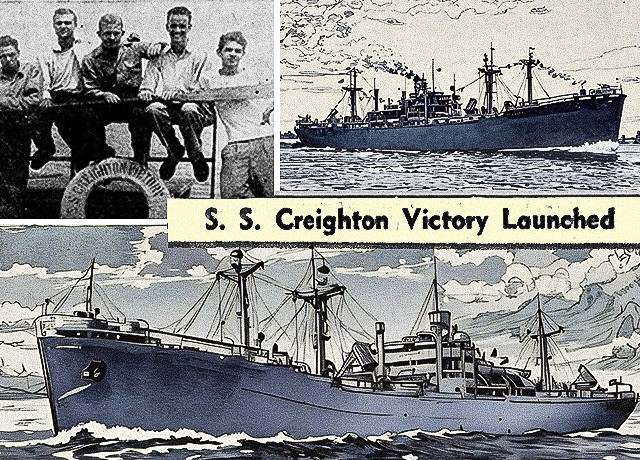Featured Testimonial About Creighton University
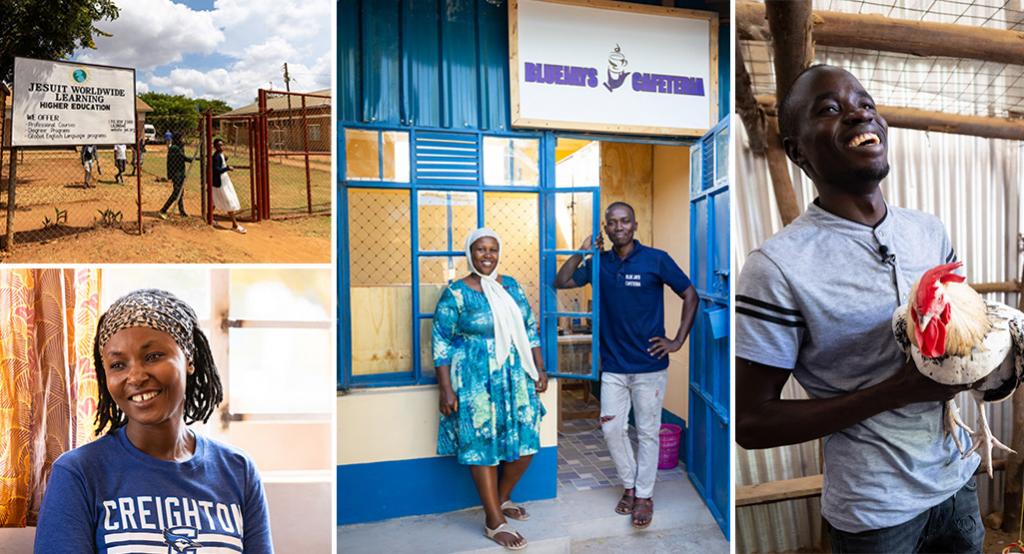
It’s just incredible to see these refugees, our students in many ways, taking what they’ve learned in the classrooms and implementing it in these really terrific projects.
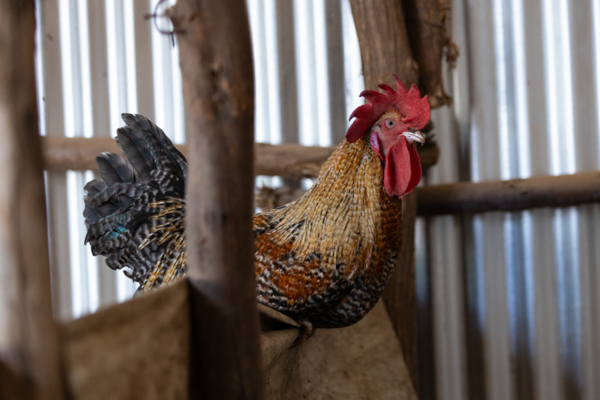
See more: View a gallery of images by Creighton photographer A.J. Olnes
Read an alum's account of the trip.
See a video of the JWL students' Innovation Grant-funded projects.
* * *
By Micah Mertes
More than 8,000 miles from 2500 California Plaza, Creighton President the Rev. Daniel S. Hendrickson, SJ, PhD, walked into a chicken coop in the Kakuma refugee camp of northwest Kenya to learn the finer points of raising poultry and selling eggs.
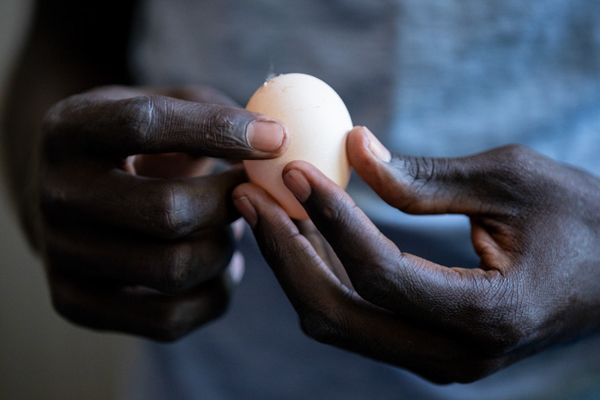
These 70 chickens provide a living for Abraham, a 28-year-old Sudanese native and the owner of Hong Kong Poultry Farm. (Hong Kong is a neighborhood in the Kakuma camp.) The chickens’ eggs — which go for 15 Kenyan shillings (or about 10 cents) a piece — offer a valuable resource to Abraham’s food-insecure community.
“These eggs are fertile and organic and also very nutritious,” he says. “We believe this will solve the problem of nutrition. Although not for everybody, even if two or three families can buy eggs every day, we believe that a problem is solved.”
Hong Kong Poultry Farm is one of a dozen businesses to be funded through the Creighton Innovation Grants awarded in 2023. The grant program was established by Creighton donors to support startup businesses in African refugee camps.
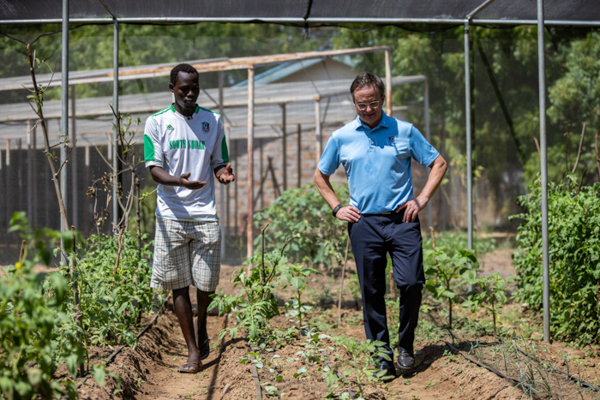
All grant recipients are students or graduates of Jesuit Worldwide Learning (JWL), a program that has provided online higher education courses to individuals in refugee camps around the world since 2010. Along with other members of the Association of Jesuit Colleges and Universities, Creighton faculty members teach JWL students thousands of miles from campus.
This winter, Fr. Hendrickson led a Creighton delegation of University staff and alumni to see the progress of the businesses in Kakuma and the Dzaleka camp (in Malawi). Besides Abraham’s chicken farm, the businesses include a bakery, a soap company, two greenhouses and a restaurant named the Bluejays Café. The business owners come from a wide variety of African countries.
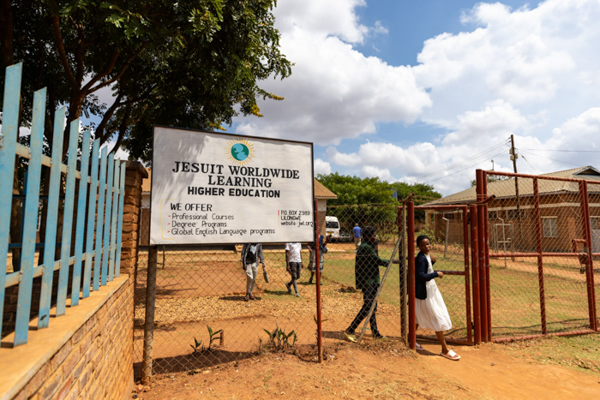
“It’s just incredible to see these refugees, our students in many ways, taking what they’ve learned in the classrooms and implementing it in these really terrific projects,” says Fr. Hendrickson, who has been to the area four times, having also lived in Tanzania for a year.
“The students are creating sustainability and revenue and other kinds of investments in their lives and the community around them.”
The Kakuma refugee camp was established in 1992 following the arrival of the “Lost Boys of Sudan.” The camp and the Kalobeyei Integrated Settlement have a population of about 250,000 registered refugees and asylum-seekers. More than 50,000 refugees live in the Dzaleka camp.
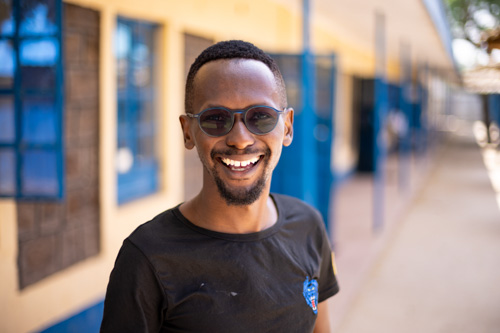
In both camps, the Creighton grants — ranging from $1,000 to $4,000 — go a long way.
“For the JWL students,” says Melvin Kiruja, a JWL academic manager in Kakuma, “they make their hopes and dreams come alive.
“The students have entrepreneurial skills they learned within their JWL courses, and (with the grant support) they are now able to implement them in a business that is beneficial to both them and the community at large.”
Kiruja’s JWL colleague in the Dzaleka camp, Wongani Banda, says the opportunities presented to the students allow them to “go out into the community, spread hope and help others.”
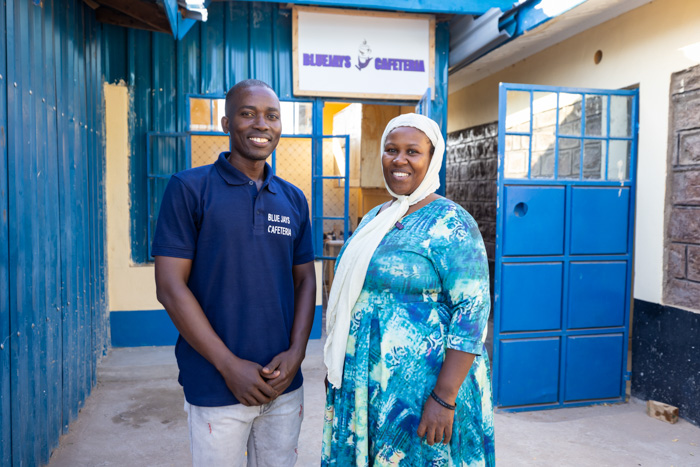
And feed others. At the Innovation Grant-funded Bluejays Café, owners Deo and Sarah, both from Uganda, cater to their fellow students on the JWL campus.
“We serve a need,” Sarah says. “Students would stay at school without eating or they would walk long distances to get food elsewhere. So there was a need for them to get something on campus. And because we had the skills in catering, we thought it would be a good opportunity to do that specific business.”
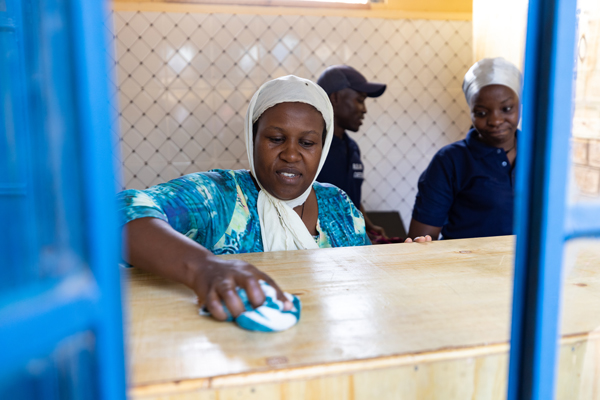
On an average day, Bluejays Café serves tea and chapati (a flaky, chewy flatbread popular in East Africa) to about 40 customers. Deo says they plan to continue expanding, reaching out to several organizations and providing outside catering services.
Other members of the Creighton delegation to the Africa refugee camps included Rev. Nicholas Santos, SJ, associate professor in the Heider College of Business and rector of Creighton’s Jesuit community, and Peter Goeckner, BA’17, and Erik Sheagren, BS’18, alumni with international service experience who were invited by Fr. Hendrickson.
“The populations in the camps,” Fr. Santos says, “are the poorest of the poor. They have no identity. No status. It’s really heartening that there have been donors who have stepped up to support JWL and to support some of these Innovation Grants.
“These businesses demonstrate the entrepreneurial spirit of the refugees, who, in spite of many conditions they are faced with, are able to have a sense of agency and a sense of self-worth in what they are doing.”
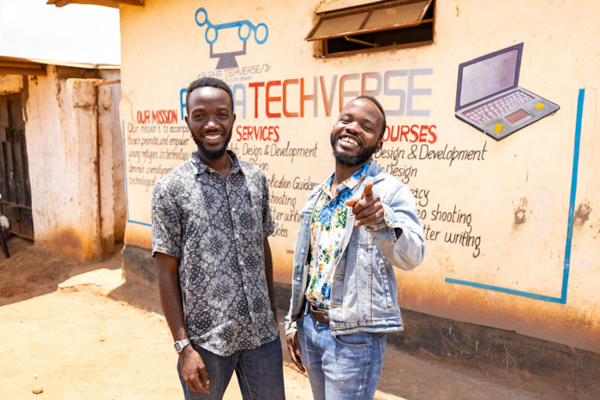
Sheagren says he found the ingenuity of the Innovation Grant projects to be endlessly inspiring.
“One of the projects we saw in the Dzaleka camp is called Alpha Techverse,” he says. “JWL students John and Emmanuel (from Rwanda) created a school to give people basic skills in digital literacy, such as graphic design, web design and coding. Once they teach them, they are hoping to help them get contract work with companies in other countries.
“And they’re doing all of this in a facility that doesn’t even have electricity. They’re using a neighbor’s generator to power the school. What these students are achieving is remarkable.”
One of the core principles of a Jesuit education, Sheagren says, “is being a person for and with others. Nowhere have I seen an implementation of that vision more concretely than here.”
The Innovation Grants program is as Creighton as it gets, Goeckner says.
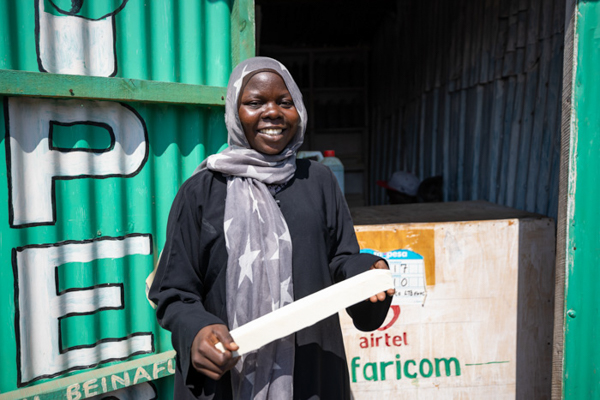
“It’s Creighton in a nutshell. It’s understanding the realities of this world. It’s connecting with others across the globe. It’s assisting those in need. It’s providing dignity through education and empowerment, and it’s being a person for and with others.
“And it’s been beautiful to see.”
With every project, Goeckner says, the JWL students are fulfilling the community’s most essential needs.
Through the business Shanab Detergent, Sadia (from South Sudan) makes solid and liquid soap in Kakuma.
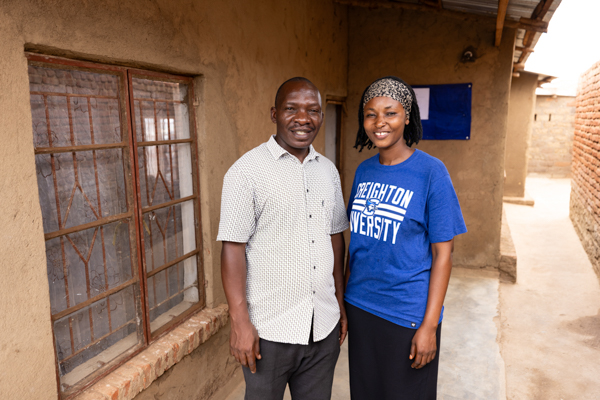
Through their Life Building Foundation, Prince and Esther (from the Democratic Republic of the Congo) raise pigs, provide well water and empower girls in Dzaleka through education and skill straining.
Through Kakuma Social AgriVentures and a greenhouse in Dzaleka, Dominic (from South Sudan), Elvis (from Zimbabwe) and Edith (from Rwanda) produce okra, kale and other highly nutritious vegetables for the community.
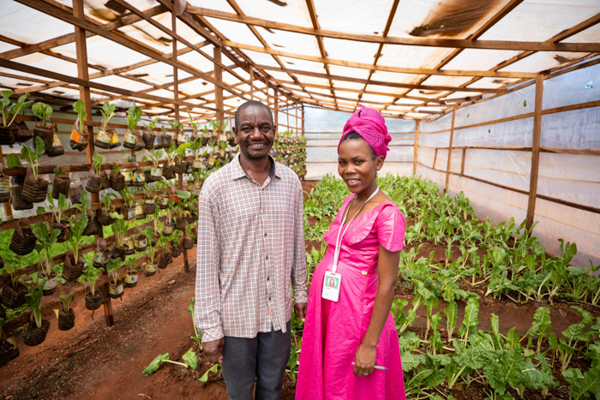
“Our very biggest ambition is to start something that has sustainability,” says Edith. “That has been our dream. When we (received the grant from Creighton), that was the greatest achievement of our life.”
With continued support from Creighton donors, the businesses now look to expand and form deeper connections in their communities. In nearly every case, the goal of the JWL students and graduates is to do more. To provide more food, more services, more education, more opportunities and, of course, more chickens.
Back at Hong Kong Poultry, Abraham sees great potential in his growing farm. With the purchase of an egg incubator, he says, he can expand his operation, achieve more autonomy and feed more people. He can foster the growth of “a dream I have been dreaming for the last three years.
“I want you to feel, the entire University, the donors, I want you to feel that we are so grateful, and we hope there is a possibility to support even more youths. Because there are many, many others like me who also have dreams.”
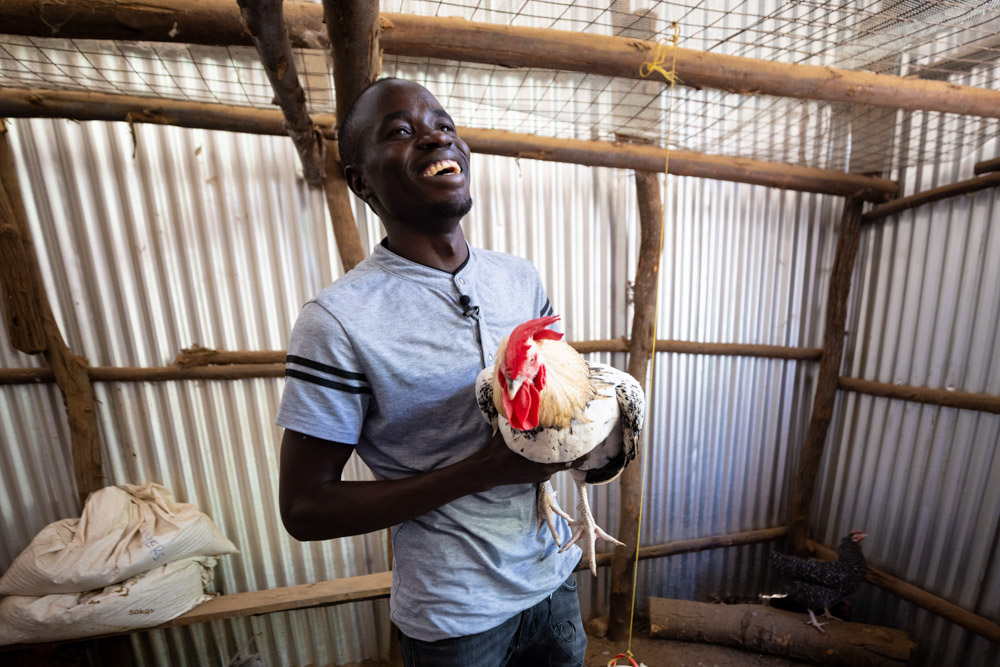
* * *
Read alumnus Erik Sheagren's account of the trip.
See more images of the Africa delegation and Creighton donor-supported businesses here.
Or click the image below.
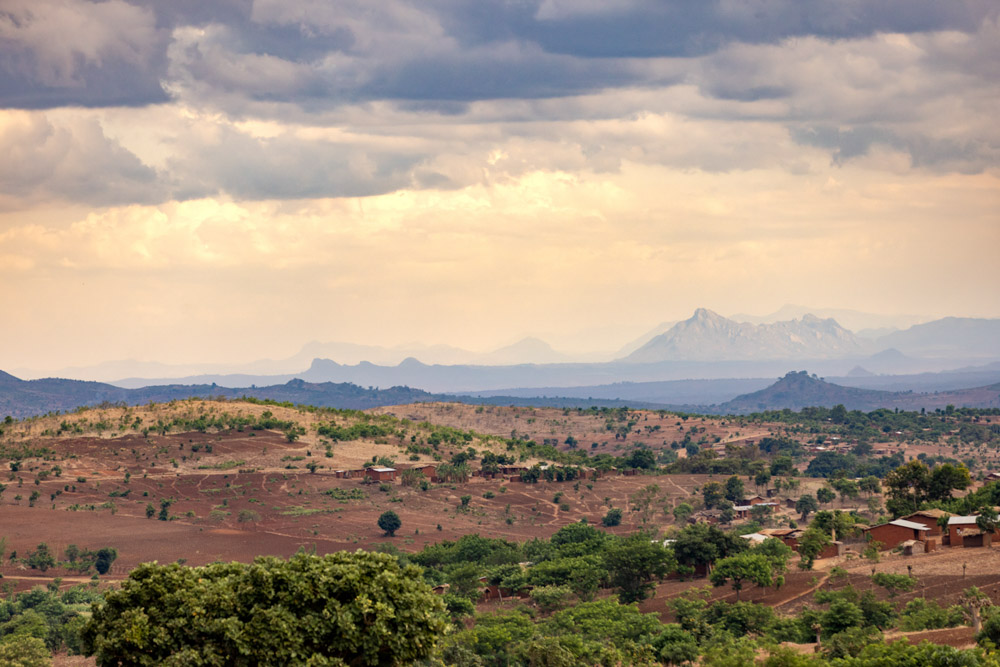
* * *
